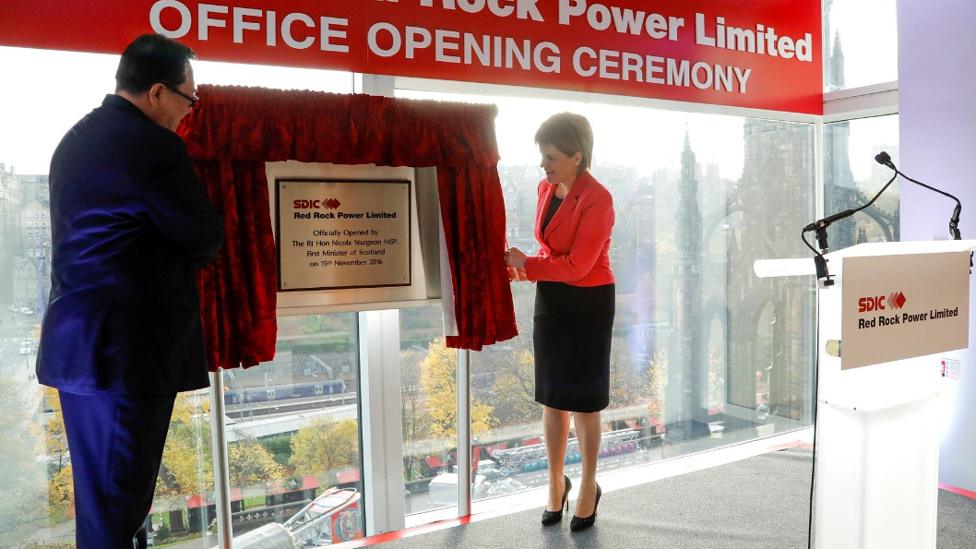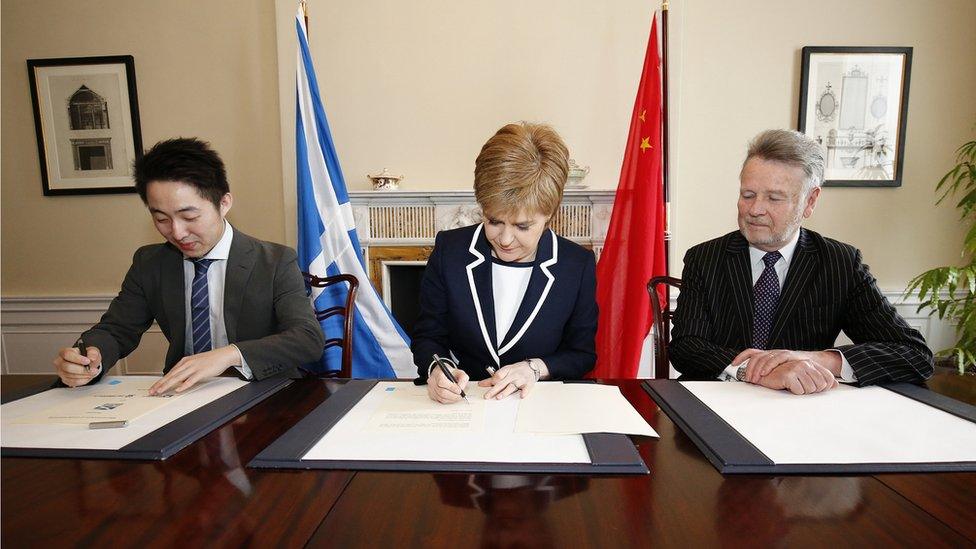China 'will still invest in Scotland'
- Published

Nicola Sturgeon has opened the new Edinburgh office of a Chinese power company
Chinese companies are unlikely to be deterred from investing in Scotland despite the collapse of a possible £10bn deal, MSPs have heard.
It emerged last week that two state-backed Chinese firms had withdrawn from a memorandum of understanding (MoU) with the Scottish government.
The deal had come under intense scrutiny from opposition parties.
But international business experts told Holyrood's Economy Committee that it would not have a long-term impact.
The MoU had been signed in March by First Minister Nicola Sturgeon, as well as SinoFortone and China Railway No3 Engineering Group (CR3).
But opposition parties accused the government of secrecy over the agreement, which only became public knowledge when it was revealed by newspapers.
'Show due respect'
It also emerged CR3's parent firm has been singled out by Amnesty International for apparent human-rights abuses in the Democratic Republic of Congo and faced allegations of "gross corruption" by the Norwegian Oil Fund.
Giving evidence to the committee on the impact of Chinese withdrawal, Neil Francis, international operations director at Scottish Development International, said: "I think it's really important that we don't let it have a long-term impact on relationships.
"Everything is based on having a consistent, long-term approach to that particular market and to show due respect to the time it takes to build those relationships.
"It is a vast, vast, vast country and there are a huge number of opportunities, and we just have to take our time to ensure that everything we do reinforces the kind of perspective that we are open for business, that we value doing trade and investment with our counterparts in China.
"We will not let it have a detrimental impact."

The MoU was signed at the first minister's Bute House residence in Edinburgh in March, but the Chinese firms involved later withdrew
James Brodie, manager and Scotland and China business adviser at the ChinaBritain Business Council, added: "I would just make one point in emphasising the vastness of China and the difficulty to make any kind of a splash, either positive or negative, in the Chinese media.
"So, I would reassure you that I don't suspect that the impact upon the wider investment community will be of any significance".
Ms Sturgeon has said her government will continue to try to attract investment from China despite the collapse of the MoU, and has blamed opposition politicians for creating a "political climate in which these partners felt they couldn't proceed".
'Vote of confidence'
The first minister opened the new Edinburgh offices of Chinese power company Red Rock Power Limited, a subsidiary of State Development and Investment Corporation (SDIC), on Tuesday.
The Scottish government said the state-owned investment holdings company plans to invest further in renewable developments in Scotland, building on its existing offshore wind projects.
Ms Sturgeon said: "SDIC's presence here is a vote of confidence in our renewables sector and we are committed to working closely with SDIC to support their investments in Scotland.
"We also want to identify opportunities for Scottish supply chain companies in the Chinese market and are keen to work with SDIC to stimulate more investment into Scotland."
She met with Wang Huisheng, chairman of the SDIC board, who said: "We are looking forward to participating in more areas of Scottish economic development and contributing more to the prosperity of Scotland."